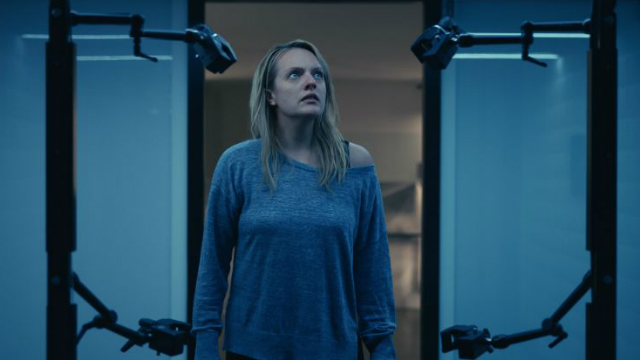Finally, Universal has remade one of their classic monster movies in a way that doesn’t feel offensively dumb. That’s the good news. Unfortunately, The Invisible Man is so good at being unpleasant and uncomfortable that it may legitimately be too much for some viewers. Anyone who has ever been stalked by an “evil ex” will recognize elements of this story all too well.
Previous Invisible Man movies cast charismatic actors from Claude Rains to Kevin Bacon as transparent stalkers, yet Leigh Whannell‘s never lets you know him. Not only do we not get a good look at Adrian Griffin (Oliver Jackson-Cohen) for most of the movie, we barely hear him speak either. Like the malevolent demons of Blumhouse‘s signature Paranormal Activity franchise, he remains mostly an unseen, evil force messing with his ex’s mind. It’s a tactic that puts the viewer completely in her headspace. Whannell must know all too well from the Saw movies that casting somebody like a Tobin Bell can have fans identifying with the villain before too long.

Identity theft and mind games are terrifying enough real-world threats. Narcissists in relationships are highly skilled in making the victim look like the crazy person, and imagining one also skilled in online fraud and hacking sounds like a nightmare. Now add immense physical strength and an ability to creep into the victim’s home undetected. Abuse victims often perceive their stalkers in this outsized way. In the case of Cecilia (Elisabeth Moss), her monster is literally all of those things. And he’s so good at covering his tracks, people think she’s the crazy one.
RELATED: Review: Birds of Prey
We first meet Cecilia making a late-night escape from Adrian’s ultra-modern mansion. Our experience of him is as but a body lying next to her. Then, moments later, as a bloody fist punching through glass. Cut to two weeks later, she’s an agoraphobe staying with a policeman pal (Aldis Hodge) and his daughter (Storm Reid). And the news headlines proclaim that her ex just killed himself.
Obviously, that’s fake news. And the fact that Adrian was one of the leading experts in light refraction technology ought to clue people in on his scheme. This Invisible Man sidesteps the whole nudity issue most such movies have through a more modern stealth suit. Perhaps it’s just coincidence that his life’s work helps him torment an ex.

In Insidious 3 and Upgrade, director Whannell frequently leavened the horror with humor, via bumbling ghostbusters and physical comedy. No such release comes here. The thought process of a stalking victim is one of constant edginess. And the movie stays that way uncomfortably long. It’s likely no spoiler to say the tables turn, but some may wonder if all the anxiety was worth the payoff. Though there’s no specifically sexual violence, The Invisible Man has a lot of spiritual kinship with rape-and-revenge movies like I Spit on Your Grave. Interestingly, my female friends so far have been unanimously enthusiastic. Perhaps that’s a lesson for me in a type of fear they’re (unfortunately) more used to.
RELATED: Review: It Chapter Two
Blumhouse’s signature formula is to set the entire movie inside one house, with a hidden thing threatening the resident family. Whatever it is — aliens, ghosts, demons, rich kids immune from the law — reveals itself in the third act. The formula is broken here by having at least three primary locations, and about two-thirds in using judicious CG to show us more than nothing of the villain. Adrian’s home/lab is reminiscent of the similar one in Upgrade, while the house Cecilia flees to is more typical Blumhouse style. Thrown in the midst is a psychiatric institution that gives us the obligatory Sarah Connor vs. Terminator moment. None of this is especially beholden to either H.G. Wells or James Whale. Mercifully, it also sees no responsibility to bolster a proposed Dark Universe.
It turns out that actually letting a horror writer-director handle a famous monster remake was the best idea. While the classic Universal strategy was to make the creatures semi-sympathetic, a modern era with a world that feels full of real monsters demands a new strategy. By identifying with the victim instead, and stripping as much humanity as possible away from her foe, Whannell gives the power vicariously to the viewer when the abused finally fights back. But for those who’ve had any experience with real-life stalkers, consider this your trigger warning.
Rating: 3.5/5




